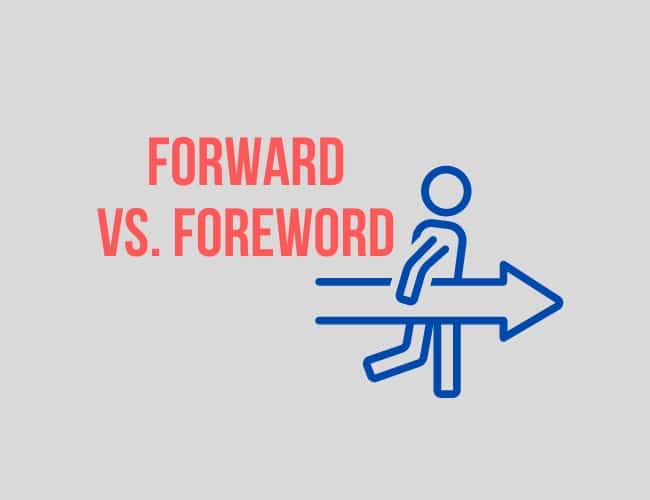Forward vs. foreword? What's the difference?
English is full of homophones, words that sound the same but mean different things. Often, they are spelled differently. Everyone is aware of the problems with there, there, there; too, too, two; and carat, caret, carrot. (Well, maybe not that last one so much.)
Forward and Foreword are two more homophones that cause problems. So, let's take a look at them.

Forward vs Foreword
Definition of ‘Forward'
‘Forward' can function as an adjective, adverb, verb, or noun. See how versatile it is? The basic sense is having to do with what is ahead or in front. So, forward motion is movement ahead. To move forward is to move ahead or in front.
For the verb meaning, to forward is to send ahead.
As a noun, a forward is a player who holds a position in front of other team members, close to the opponent's goal, such as a forward in soccer, basketball, or hockey.
Definition of ‘Foreword'
‘Foreword' is a commentary that comes before the main body of text in a book or other written work. The noun foreword in this case refers to the introduction to a book and it is written by someone other than the author.
Etymology: Tracing the Origins
The Origin of ‘Forward'
‘Forward' comes from Old English forewearde and is a compound of fore, “in front of, before, earlier than” plus –ward, “turned in the direction of.” We encounter -ward regularly: backward, toward, and afterward are in common use. ‘Fore' by itself occurs most commonly in golf as a warning to those ahead of the golfer to beware incoming golf balls.
The Origin of ‘Foreword'
‘Foreword' dates from 1842 as a compound of fore, “in front of” and word, “sentence, statement, report,” etc. It may be a loan translation of the German Vorwort, “preface.” Thus, English has two words with similar meanings. A foreword is a preface.
Why the mix-up with Forward vs. Foreword? Homophones
English spelling is a strange mix of conventions from many different languages, the two primary sources being Anglo-Saxon (a Germanic language) and Norman French (a Romance language). This means that spelling and pronunciation often diverge, and this gives rise to homophones. As mentioned above, homophones are words that sound alike but are spelled differently. (And let's not get into words that are spelled the same and sound different or are spelled and sound the same but have different meanings.)
Let's see if a few examples help clarify the matter.
Examples of Forward
“Forward, march!” shouted the drill sergeant.
First class usually occupies the forward section of an aircraft.
Cristiano Ronaldo is a famous forward on the Portugal national team.
The secretary forwarded my letter to the company president.
Examples of Foreword
The foreword is often written by someone other than the book's author.
A book's foreword can give us fascinating insights into an author's life and work.
An author who writes his own foreword may explain the book's origins, acknowledgments, and thanks.
Forward vs. Foreword: a Simple Trick
As you can see, forward and foreword are not interchangeable. Here's a trick to keep them straight: foreword refers almost always to front matter in books, it's written in words. So when you see foreword, you know it's referring to the words at the front of a book.
Want more tips to keep track of tricky words? Check out our post on Afterward vs. Afterword here.
Are there other homophones that give you trouble? How do you keep them straight? Share in the comments.
PRACTICE
Now it's your turn. Set your timer for fifteen minutes. Try writing a foreword to a book you love. Label it “Foreword.” Be certain to look forward and keep moving forward in your writing. Share it in the Pro Practice Workshop here, and leave feedback for a few other writers.

Robert Harrell
Robert Harrell is a grammar nerd—and a language teacher, medieval re-creationist, musician, traveler, and theologian. His interests inform his stories and coaching. Published in German, Spanish, and French, with two English-language YA/NA series underway, Robert is pursuing The Write Practice Book Coach Certification to help other writers excel. Learn more at his website.




0 Comments